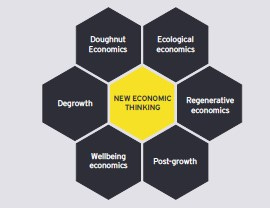Degrowth is starting to get a little more recognition.
That is a good thing.
In February, Grist ran an article titled: The growing popularity of degrowth, where they talked to Kohei Saito, the author of a best-selling book in Japan on Degrowth (the English translation Slow Down was just released in January).
Even more recently, several entities that are in no way alternative or anti-establishment, have started writing about degrowth. These articles and one report describe degrowth, or something much like degrowth in a complimentary manner.
International Consulting Firm Positive on Degrowth.
The first was Regenerative principles to unlock a sustainable future | EY - Global.
The report is very frank about the challenges we face from breaching planetary boundaries.
“Ultimately, we are still trying to retrofit sustainability in a system that is unsustainable by design.”
I suggest you read the report itself for more context, but the EY-Global team summarizes the problem nicely, focusing on:
- Unsustainable growth
- Overconsumption
- Linear economy (a throwaway society)
- Financial capital myopia
- Short-termism
- Siloed thinking
Some of the solutions they offer include:
- Sufficiency: enough for a good life, within planetary boundaries
- Circularity: aligning production and consumption with nature
- Systems thinking joining the dots to catalyze systems change
- Value redefined: putting human flourishing at the heart of value creation
- Equity and justice: achieving shared and lasting prosperity for all.
This isn’t revolutionary stuff but consider the source. EY – Global (the EY stands for Ernst & Young, one of the big four global accounting and consulting firms) is part of the giant EY consulting business. Their clients are huge global businesses who all likely want to grow their business to grow market share and make more money. It is commendable that the EY – Global says that a growth mentality that leads to overconsumption is a problem that needs to be addressed. The report does not get into policy prescriptions that lead down a degrowth path, but I don’t expect it to. They introduced the concepts of degrowth, donut economics, planetary boundaries, and many other degrowth greatest hits to their huge international client base.
It is a solid start.
The EY–Global team rarely uses the term “degrowth”, but mentions degrowth and a series of terms that often stand in for each other or overlap.
Source: EY Regenerative Principles to Unlock a Sustainable Future
Although this blog focuses on the term “degrowth”, I’m not too concerned with the terms people use as long as they are talking about the same thing.
This is all new to most people.
Suppose degrowth does start to make its way into strategy meetings and business conferences in the coming months and years. In that case, I’m quite certain that investors, businesses, and policymakers will first try to craft some type of “degrowth lite” that is very incremental and doesn’t get much accomplished.
That is to be expected.
I have seen the same thing in the sustainable investing world where I come from. First companies and financial firms tested whether just calling things “sustainable” was enough. It wasn’t.
Then they picked all the low-hanging fruit that was easy to do to see if that was enough. It wasn’t.
Now society is demanding more action and some leading companies and investors are doing the right thing. And some are still trying to get away with very little. They won't in the long run.
I expect a similar path for degrowth, (or whatever business feels comfortable calling it) at first if we truly are at an inflection point.
It is key to give those businesses, investors, and policymakers credit for having the right conversations and giving them credit for trying and telling them in no uncertain terms where and when they fall short. Because they probably will.
This blog is part of larger global efforts to normalize the idea of degrowth and get the principles behind degrowth, ecological economics, and a steady-state economy integrated into everything we do as a society. I wish it wouldn’t take time, but it will.
We can speed up that cycle by talking about it more and in more places.
So, share these conversations with more people that you think might be receptive to hearing them.
I was at a wedding this past weekend and ended up talking to a few people I didn’t know about degrowth. And they didn’t run away.
Progress.
Degrowth in the mainstream press.
Soon after the EY report came out, I saw an opinion piece in the New York Times, Shrink the Economy, Save the World
The article did a good job of laying out the main principles of degrowth and highlighting opposing viewpoints (for/against). There was nothing revolutionary there, and some folks I knew in the degrowth community were unhappy that the author didn’t seem to support degrowth enough for their liking. But I wasn’t too concerned.
An op-ed in the NY Times likely exposes the New York Times’ 7.8 million subscribers to an idea they likely had never heard of before. Many of those millions will learn more, and then start talking to people about it, spreading the word. Thanks to Spencer-Bokat-Lindell for writing that op-ed.
Harvard Business Review is Pro-degrowth? Is this a dream?
Finally, Christopher Marquis wrote In Defense of Degrowth (hbr.org) for the Harvard Business Review.
The article walks through some of the myths about sustainable growth and our current economic system, showing that degrowth appears to be part of the answer to moving to the safe side of planetary boundaries into a steady-state economy.
That someone from the Harvard Business Review calls out the myths of sustainable growth as myths was shocking to see at first. It’s not shocking anymore. The more people see these kinds of conversations, the less it will be shocking to everyone.
Nice progress, but more to do.
It is gratifying that degrowth is getting more attention. Those who read this blog and others like it are partially to thank for spreading the word.
But more needs to be done.
Degrowth is just starting to enter the mainstream. We need to continue talking about it, sharing the ideas behind it, and exposing more of our friends, families, and communities to the ideas behind a better way of life.
So, pat yourself on the back a little bit for this encouraging progress.
Then get out there and continue spreading the word.
Maybe those people who listened to me at the wedding were just being polite, or maybe they had been overserved and wouldn’t remember anything I said.
But maybe they will fire up Google to find out more. They will find a mainstream global consultancy, an Ivey League business review, and the Paper of Record treating degrowth as something worthy of their time.
That wasn’t the case a month ago.





